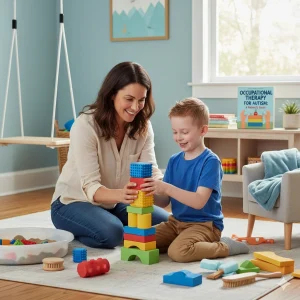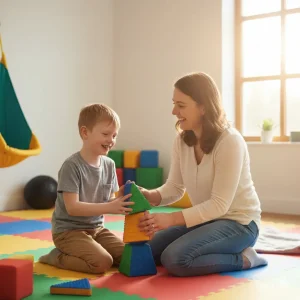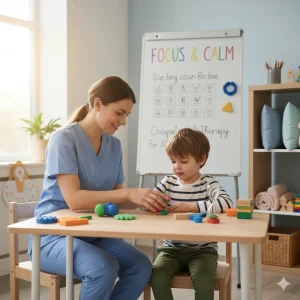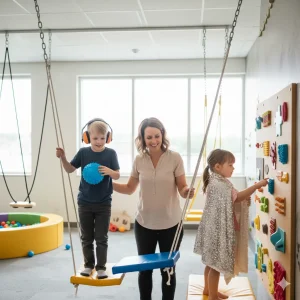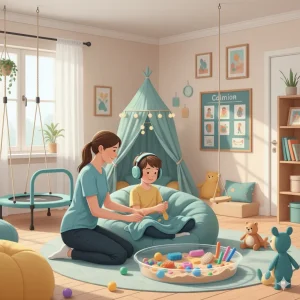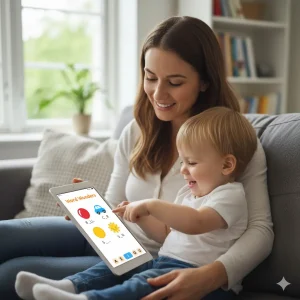When is it too late to Start Speech Therapy?
By Rajini D
Last Updated: August 7, 2025
Many parents have the same big question:
“Is it too late to help my toddler talk better?” If you’re feeling unsure or worried, you’re not alone. Maybe your child isn’t speaking as much as other kids their age. Maybe they’re still using gestures, or saying just a few words even after turning two. It’s natural to wonder if you’ve waited too long—or if things will just “catch up” on their own. That’s where speech therapy for toddlers can help—offering guided support at just the right time.
Free Speech Help for Kids
Concerned about speech delays? Book a free consultation with our expert speech therapist and get guidance tailored to your child’s needs.
Is It Ever Too Late to Start Speech Therapy?
Many parents find themselves asking, “When is it too late to start speech therapy?” The short answer is: It’s never too late. While the earlier you start, the better the outcomes tend to be, speech therapy can help children at any age—even if they’re already 3, 4, or older.
The key is to recognize the signs and act when you see them.
Why Earlier Speech Therapy Helps
When children receive support during their toddler years, their brains are still in a rapid stage of growth. They absorb sounds, words, and language patterns much faster. That’s why many experts recommend early intervention speech therapy—even as early as 18 months if needed.
But don’t worry if you’re coming in a bit later.
Can Speech Therapy Still Help After Age 3?
Absolutely. Children develop at different paces. Some are late talkers, and some may have underlying issues that only become clear closer to preschool. Whether your child is 3 or even 5, speech therapy can:
- Improve how clearly they speak
- Build longer sentences
- Boost confidence in social settings
- Support school readiness
Therapists adjust their strategies based on your child’s age and current abilities. For example:
| Age | Speech Therapy Focus |
|---|---|
| 18–24 months | First words, imitation, gestures |
| 2–3 years | Naming, two-word phrases, play-based interaction |
| 3–5 years | Full sentences, clarity, grammar, storytelling |
No matter the starting point, progress is always possible.
It’s About Support, Not Perfection
Many parents worry they’ve missed the “window.” But what matters most is taking action once you notice delays. The longer a child struggles without help, the more it can affect learning, behavior, and social skills.
That’s why places like Wellness Hub offer early screenings, personalized therapy plans, and expert-led sessions that match your child’s pace. Whether you’ve just started noticing delays or have been unsure for a while, it’s not too late to begin.
What Are the First Signs Your Toddler Needs Speech Therapy?
One of the hardest parts of parenting is not knowing if your child’s speech is “just a little behind” or something more. So let’s break it down clearly.
Here are some common signs your toddler needs speech therapy — the kind of everyday clues you can look for at home. These signs don’t mean something is “wrong,” but they do mean it’s time to explore support.
Speech and Language Red Flags by Age
| Age | Warning Signs to Watch |
|---|---|
| 12 months | Doesn’t respond to name, no babbling, little eye contact |
| 18 months | Not saying simple words like “mama” or “ball,” uses gestures only |
| 2 years | No two-word phrases (“want milk”), hard to understand, repeats same words |
| 2.5–3 years | Doesn’t follow simple directions, limited vocabulary, not combining words |
| Any age | Frustration when trying to talk, no interest in communicating with others |
Also read: Speech Delay Red Flags: What to Watch for Between 18–24 Months
Key Everyday Signs Your Toddler May Need Help
- Not responding to their name by 12–15 months
- Not saying any words by 18 months
- No two-word phrases (like “want toy” or “more juice”) by age 2
- Limited eye contact or social interaction
- Using gestures only (pointing, pulling) without trying to say the words
- Speech is unclear even to close family after 2.5 years
- Not following simple instructions like “Give me the ball” or “Sit down”
Don’t Wait and Watch Too Long
While all children grow at their own pace, consistent delays in talking, understanding, or connecting with others are worth checking out early. A quick consultation can offer clarity—and peace of mind.
Toddler Speech Milestones You Should Know
As parents, we all wonder: “Is my child talking enough for their age?” Understanding toddler speech milestones can help you spot what’s going well—and when it might be time to check in with a speech expert.
Here’s a simple, age-by-age guide to what most toddlers should be doing when it comes to talking, listening, and understanding. Every child develops at their own pace, but there are some general timelines that help us know what’s typical.
Toddler Speech Milestones by Age
| Age | What Your Child Should Be Doing | Red Flags to Watch For |
|---|---|---|
| 12 months | – Babbles with different sounds – Says simple words like “mama” or “dada” – Responds to name – Looks at objects when named | No babbling Doesn’t respond to name No clear words |
| 18 months | – Says 10+ words – Uses gestures + words – Points to familiar objects – Understands simple directions | Says less than 5 words Only uses gestures Doesn’t understand simple words like “no” |
| 2 years | – Says 50+ words – Combines 2 words (“want milk”) – Names objects – Follows 2-step directions | Not combining words Hard to understand Doesn’t follow directions |
| 3 years | – Says 3–4 word sentences – Asks simple questions (“What’s that?”) – Speech is clear to family – Understands basic concepts (big/small, up/down) | Very hard to understand Not using sentences Doesn’t ask or answer questions |
What If Your Child Isn’t Meeting These Milestones?
Missing one or two milestones doesn’t always mean there’s a problem—but if your toddler is consistently behind in multiple areas, it’s a good idea to speak with a professional. The earlier speech delays are addressed, the easier it is to help your child build strong communication skills.
When Should a Toddler Start Speech Therapy?
If you’ve ever found yourself thinking, “When should a toddler start speech therapy?”—you’re already on the right track.
The short answer?
As soon as you notice consistent delays, even before age 3.
Early intervention gives your child the best chance to catch up and thrive. Many speech and language skills start forming long before preschool, and helping early can make learning to talk smoother and more fun.
Why Starting Early Matters
A toddler’s brain is growing and making new connections every day. When a child gets speech therapy before age 3, those early experiences:
- Build a stronger foundation for talking, learning, and socializing
- Prevent small delays from becoming bigger challenges later
- Help parents support language at home with confidence
In fact, many speech therapists work with children as young as 18 months—especially when a child isn’t saying words or using gestures meaningfully.
“But Everyone Says to Wait and Watch…”
Yes, many families are told to “wait and see.” And while some kids do catch up naturally, it’s important to trust your gut. You know your child best.
If your toddler:
- Isn’t talking as much as other children their age
- Seems frustrated when trying to communicate
- Isn’t using words, gestures, or sounds to connect
…it’s absolutely okay to get a speech evaluation now rather than wait.
What Happens If You Start Speech Therapy Late?
If you’re worried about starting speech therapy late, you’re not alone—and you’re not too late.
Life gets busy. Sometimes we hope our child will “catch up soon.” But when speech therapy is delayed, a few extra challenges can come up. That’s why understanding the impact—and acting now—can make a big difference.
Challenges of Starting Speech Therapy Late
When therapy begins after the age of 3 or 4, some toddlers may:
- Struggle more with expressing their needs clearly
- Get frustrated more often, which can affect behavior
- Fall behind in learning at preschool or school
- Miss out on key social moments with other kids
- Need longer or more frequent therapy to catch up
It’s not just about talking—it’s about connecting, learning, and growing.
But Here’s the Good News…
Even if you’re starting later than planned, progress is always possible.
The brain is still learning. Children are still curious. With the right support, even older toddlers or preschoolers can:
- Learn to speak more clearly
- Gain confidence in social settings
- Build the skills they need for school
It’s better to start now than to wait even a few more months hoping things will improve on their own.
Gentle, Goal-Based Support from Wellness Hub
At Wellness Hub, we meet your child where they are—whether they’re 18 months or 4 years old. Our team:
- Creates personalized therapy plans based on your child’s age and needs
- Supports parents with home strategies that really help
- Makes therapy fun, flexible, and pressure-free
You haven’t missed the window. It’s still wide open—and we’re here to walk with you through it.
Tips for Parents Worried About Their Toddler’s Speech
Feeling worried about your toddler’s speech is completely normal. You’re not overreacting—you’re paying attention. And that’s a good thing.
While professional support is important when needed, there’s also a lot you can do at home. These simple, everyday strategies can gently boost your child’s speech and help them feel more confident while communicating.
Easy Daily Tips to Encourage Talking
Here are small steps you can start using today:
1. Talk During Everyday Routines
Use daily moments—like meals, bath time, and dressing—to talk to your toddler. Describe what you’re doing:
“Let’s put on your socks.”
“Time to wash your hands.”
This builds vocabulary in a natural, no-pressure way.
2. Read Together Every Day
Choose short, colorful books with big pictures. Point to items and name them:
“Look! A dog. The dog is running.”
Repetition helps your toddler hear and learn new words.
3. Use Simple, Clear Words
Keep your language short and easy to copy. For example:
Instead of “Would you like to play with the ball now?”
Say “Play ball?”
Simple words stick better and make it easier for your child to respond.
4. Pause and Wait
After saying something, pause for a few seconds. Give your child time to think and try to reply—even if it’s just a sound or a gesture.
This encourages back-and-forth communication, which is the foundation of speech.
5. Limit Screen Time
Screens don’t talk back the way people do. Too much screen time can reduce the chances for real conversation.
Instead, focus on face-to-face play where your child can see your mouth move, hear your tone, and feel your attention.
Gentle Support from Wellness Hub
If you’re still feeling unsure, know that help is available. At Wellness Hub, we guide parents like you through simple strategies, speech screenings, and expert-led therapy when needed. Sometimes, just having someone to talk to can ease your worries—and that’s where we come in. Try our free speech language test or book a call to talk with a speech therapist today.
Conclusion
If you’re feeling unsure about your toddler’s speech, don’t wait. Starting speech therapy for toddlers early gives your child the best chance to learn and grow. It’s okay to ask questions—even before others notice a delay. At Wellness Hub, we make it easy with expert-led sessions, simple tips, and caring support. You can start with a free consultation and find out what your child needs. Every word matters, and your support means everything. Book a free consult today and take the first step toward better speech and happy communication.
Frequently Asked Questions:
1. When should I worry about my toddler’s speech?
You should consider speaking to a speech therapist if your child isn’t saying any clear words by 18 months or isn’t combining two words like “want milk” by age 2. Other signs include not responding to their name, using gestures instead of words, or struggling to follow simple instructions. These may be early signs of a speech delay, and getting help early can make a big difference in your child’s development.
2. Is 2 years old too early to start speech therapy?
No, 2 years old is actually a great time to begin speech therapy for toddlers if there are any concerns. At this age, most children are building vocabulary quickly. If your child isn’t doing that, early therapy can help them catch up. Starting early means your child can learn language and communication skills during their most important growth years.
3. What are the signs my toddler may need speech therapy?
There are some clear signs you can look out for:
- Not saying single words by 18 months
- Not combining words by age 2
- Not responding when their name is called
- Using only gestures (like pointing or pulling) to communicate
- Very limited eye contact or interaction
These signs often show that your child may benefit from a speech evaluation.
4. Is 3 years old too late for speech therapy?
It’s never too late to start. While early support is best, children at age 3 or even older can still make great progress. Starting speech therapy late may take more time, but it still works. The important thing is not to wait any longer if you already have concerns. The sooner you begin, the sooner your child gets the help they need.
5. How does speech therapy for toddlers work?
Speech therapy for toddlers is not like classroom learning. It’s fun, play-based, and child-friendly. A speech therapist uses toys, games, books, and everyday routines to help your child learn words, make sounds, and express their thoughts. Sessions also guide parents on how to talk and interact with their child in ways that boost speech development at home.
6. Can my child catch up without speech therapy?
Some children are late talkers and do catch up on their own. But in many cases, without therapy, a speech delay can continue and affect learning, social skills, and confidence. A speech therapist can tell you if your child is likely to catch up or if they need extra support. It’s better to check early than to wait and hope.
7. How many words should a 2-year-old say?
By age 2, most toddlers can say at least 50 words and begin putting two words together like “want toy” or “go park.” If your child is using fewer than 20 words or not combining words yet, it may be a sign of a speech delay. A speech therapist can help evaluate your child’s communication skills and guide you from there.
8. What causes speech delay in toddlers?
There are many possible reasons for speech delays in toddlers. Some common causes include:
- Hearing problems (e.g., ear infections)
- Autism or other developmental conditions
- Limited social interaction
- Too much screen time
- Family history of speech delays
In some cases, no specific cause is found, but therapy still helps your child make progress.
9. Can I help my toddler talk more at home?
Yes! You play a big role in helping your child speak more. Some easy things you can do:
- Talk to your child during daily routines like meals or bath time
- Read simple books together every day
- Use short, clear phrases they can copy
- Pause after speaking to give them time to respond
- Reduce screen time and increase face-to-face play
These habits, combined with therapy if needed, can build strong communication skills.
10. How do I get started with speech therapy at Wellness Hub?
Getting started is easy. Just visit Wellness Hub’s speech therapy page and book a free consultation. One of our speech therapists will talk with you, understand your concerns, and help you decide the best next steps. Whether your child needs therapy or just some home tips, we’re here to support you.
About the Author:
Rajini Darugupally
M.Sc., Speech-Language Pathologist (9+ years of experience)
Rajini is a passionate and dedicated Speech-Language Pathologist with over 9+ years of experience, specializing in both developmental speech and language disorders in children and rehabilitation in adults. Driven by a desire to empower each individual to find their voice, Rajini brings a wealth of experience and a warm, genuine approach to therapy. Currently, at Wellness Hub, she thrives in a team environment that values innovation, compassion, and achieving results for their clients.
Book your Free Consultation Today
Parent/Caregiver Info:
Client’s Details:
* Error Message

